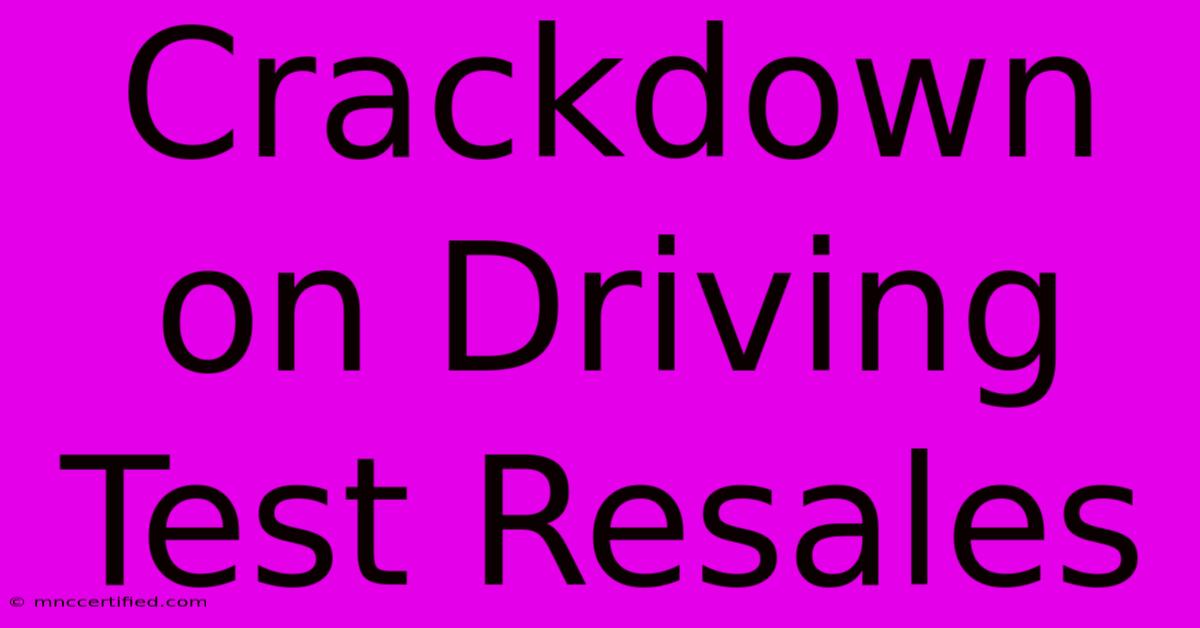Crackdown On Driving Test Resales

Table of Contents
Crackdown on Driving Test Resales: Protecting Integrity and Public Safety
The resale of driving tests – a practice that undermines the integrity of the licensing system and jeopardizes public safety – is facing increased scrutiny. This article delves into the escalating crackdown on this illegal activity, exploring its impact, the methods employed to combat it, and the future of driving test administration.
The Problem: A Thriving Black Market
The sale of driving test appointments, often involving inflated prices and fraudulent means, presents a significant challenge to road safety. This illegal market thrives on exploiting vulnerabilities within the system, creating unfair advantages for some while denying others the opportunity to obtain their license fairly. The consequences are far-reaching:
- Increased Risk to Public Safety: Individuals obtaining licenses through fraudulent means may lack the necessary driving skills and knowledge, posing a significant threat to themselves and other road users.
- Erosion of Public Trust: The black market undermines public confidence in the fairness and integrity of the driving test system.
- Financial Loss: Government agencies and legitimate test centers suffer financial losses due to the diversion of resources and revenue.
- Inequitable Access: Those who cannot afford to buy their way through the system are unfairly disadvantaged.
The Crackdown: A Multi-Pronged Approach
Authorities worldwide are implementing a range of strategies to combat the resale of driving tests:
Enhanced Security Measures:
- Improved Online Booking Systems: Sophisticated systems are being introduced to prevent bots and automated systems from acquiring appointments en masse. These often involve CAPTCHA verification, waiting lists, and randomized appointment allocation.
- Biometric Verification: Implementing biometric identification during the test process helps prevent impersonation and ensures that the individual taking the test is the same person who booked the appointment.
- Increased Surveillance and Investigation: Law enforcement agencies are actively investigating suspicious activity and prosecuting individuals involved in the resale of driving tests. This often involves collaborating with online platforms and data analysis to track fraudulent activity.
Strengthened Legal Frameworks:
- Increased Penalties: Higher fines and potential jail sentences are being introduced to deter individuals and organizations involved in this illegal activity.
- Improved Legislation: Laws are being strengthened to explicitly address the resale of driving tests and the associated fraudulent activities.
- International Cooperation: Collaboration between countries is vital to tackle cross-border operations and trafficking of fraudulent documents.
Public Awareness Campaigns:
- Educational Initiatives: Public awareness campaigns inform prospective drivers about the dangers of purchasing driving tests and the potential legal consequences.
- Community Engagement: Working with community organizations to spread awareness and encourage ethical behavior.
The Future of Driving Test Administration: A Focus on Integrity and Accessibility
The fight against the resale of driving tests is an ongoing battle requiring a multifaceted approach. Future strategies will likely focus on:
- Further technological advancements in appointment booking systems to prevent manipulation and fraud.
- Continuous monitoring and evaluation of the effectiveness of current measures.
- Improved collaboration between government agencies, law enforcement, and driving test centers.
- Greater transparency and accountability in the driving test system.
In conclusion, the crackdown on driving test resales is crucial for protecting public safety, upholding the integrity of the licensing process, and ensuring equitable access for all aspiring drivers. By combining technological innovation, strengthened legal frameworks, and effective public awareness campaigns, authorities can effectively combat this illegal practice and build a more robust and reliable driving test system.

Thank you for visiting our website wich cover about Crackdown On Driving Test Resales. We hope the information provided has been useful to you. Feel free to contact us if you have any questions or need further assistance. See you next time and dont miss to bookmark.
Featured Posts
-
Trump Case Willis Steps Aside
Dec 20, 2024
-
Teamsters Led Amazon Worker Strike
Dec 20, 2024
-
Celtic Target Tierney Arsenal Exit
Dec 20, 2024
-
Big Lots Closing Stores Whats Happening
Dec 20, 2024
-
Cavuto Leaves Fox News After 28 Years
Dec 20, 2024